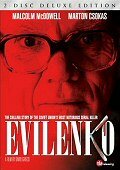|
DVD Review
|
|
|
| Director |
|
David Grieco
|
| Cast |
Malcolm McDowell
Marton Csokas
Ronald Pickup
Frances Barber
Alexei Chadyuk
Ostap Stupka
|
| Distributor |
TLA Releasing
|
| DVD Release Date |
| 7th February 2006 |
| Running Time |
| 111 Minutes |
| Number of Disks |
| 2 |
| Certification |
|
Not Rated
|
|
Reviewed By
|
|
William P. Simmons
|
|
Buy this film
|
|
|
|
|
|
EVILENKO (2003)
|
A moody, introspective story more concerned with a reflective examination of a sick, agonized mind (and the innocents who suffer as a result of a man’s misplaced ego) than on providing the standard ‘horror-slasher’ audience with its requisite thrills, Evilenko is less a ‘traditional’ genre film than an attempt to treat madness with tragic seriousness. While the director’s effort to forgo sensationalistic viscera for an introspective plot focused on characterization is admirable, the results are less so. An enthusiastic -- and for the most part -- mature examination of mental sickness, this uneven addition to the psycho-sexual thriller doesn’t quite know what genre or form it wishes to contribute to. As a result of occasionally muddled characterization and veering plot elements, it is neither completely successful as drama or exploitation. It does, however intrigue with its fine performances and general quality of disturbing introspection.
Based on the true story of A. R. Cikatilo -- ‘the monster of Rostov’ -- Evilenko, played by the wonderful if often ignored Malcolm McDowell, is a serial killer responsible for the grisly murders of over fifty children, each of which he ate. The film’s emphasis on the cultural, political, and economical atmosphere of the old Soviet Republic is no less a character in this vivisection of morality than McDowell’s monstrous abuser, lending authenticity and a sense of moral corruptness, lethargy, and bleakness to a morose plot whose surface actions are seeped in its environment‘s deterioration. V. T. Lesiey, the detective who tracks Enko, is performed by Marton Csokas. This uncharacteristic hero, while not likeable or as sympathetically portrayed as is normal in noir thrillers, is more convincing because of the ambiguity surrounding him.
While the script takes more than a few liberties with the facts behind the Andrei Chikatilo murders, the subversive tone is decrepit enough that it mirrors the truth symbolically if not always in particulars. This film is an attempt to dissect the mental/emotional geography of an all-too-human monster, and in this regard, the acting and direction are successful. Of less surety is pacing and structure, which veer amidst past and present in a confusing manner that might be attempting to lend an air of surrealism or subjectivity to the events -- or perhaps attempting to mirror the chaotic state of the madman’s mind -- but which instead muddle the narrative, and likewise our attention.
Filmed in the Ukraine, Chikatilo may be seen as a symbol of the dying communist regime of the Soviet Union, with its artful interweaving of youngsters enjoying life beneath trees and drab, cold, threateningly impersonal interrogation rooms (stained with various bodily fluids) embodying the sickening contradiction of McDowell’s public persona and private life. Eluding the obsessive clutches of Detective Lesiev (rather like a real Sam Loomis) Chikatilo seeks in Communism (and murder) an identity that his emotional inability to connect with the outside world has denied him.
Those seeking a thrill-ride through the meat-and-cum charnel parade of either splat-exploitation or the popcorn sensibility of the Slasher will be disappointed by this unevenly structured if seriously treated vivisection of humanity, decency, and alienation in a modern world that is partially responsible for its outsiders -- whose inability to cope or contribute to society become instead monsters praying off it. Changing Chikatilo’s name to Andrei Romanovic for some unfathomable reason, further separating it from its historical origins, director Grieco mirrors McDowell’s descent into depravity with the breakdown of his beloved country. And while the police procedural elements of the film become old fast, such creepily evocative moments as Enko luring innocent children to their doom, and the conviction with which he disguises his monstrousness, recommend the picture for those in search of a disturbing examination of a human monster’s mental decay achieved with little more than suggestion.
Commendably free of grain or surface blotches, the DVD picture is solid with decent colors and audio likewise serviceable if not pristine. Extras provide further historical and social commentary, surrounding the feature with illuminating context, including “Dossier: Andrei Chikatilo,” a 27 minute scrutiny of Evilenko’s basis, his crimes, personality, and the legal hunt that ensued. This is followed by 81 minutes of interviews with cast and crew that focus primarily on the aesthetic rationales of certain changes in the story, casting, and technical matters. The theatrical trailer complete this sometimes troubled, always troubling descent into depravity.
|
|
Score
|
|
6 / 10
|
|
|





